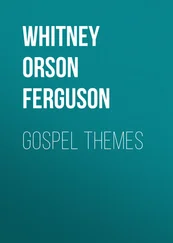“They aren’t gay,” I said, turning to the woman on my left, [REDACTED], who nodded in agreement. She was the dinner’s resident expert on American politics, but she counted pop music among her exceptionally broad interests. Her father was a senator and she served as a representative in New York’s delegation in the House. “There’s no way,” I said.
“Have you seen them in concert?” [REDACTED] said to me, “How they touch one another? So gay!” He was solemn and a few people mumbled in agreement. Representative [REDACTED] finished her glass of wine and shook her head in disagreement.
“No,” I said. “You need more proof than that. They’re just being boys.”
“Boys, all right,” [REDACTED] said.
We were all very drunk. Some people turned to Katy to search her face for any hint she might know about the love lives of Louis and Harry, but she had already assured us that she had no inside information (throughout the night she claimed she was too busy to have friends in the music industry). In any case, she didn’t seem to be paying attention to anyone but her current boyfriend, who kept whispering in her ear in an excited, somewhat irritated manner. Finally she frowned and waved him away, then turned from all of us to stare at a wall, where somewhere her personal assistant must have been standing in the shadows. I hadn’t thought the star of the night would fade so quickly, but by the second course she was nearly gone: quiet, indifferent, distracted. Her melancholy rendered her a barely visible blue at the edge of the table where the candlelight dropped off.
“The proof,” [REDACTED] said, mostly slurring, “is in their entire team, which is not only composed of assistants, producers, and other handlers, but also: a corporate mass electronic surveillance data mining program — known in some circles as DARK HORSE — run by a shadowy group of privacy experts who work at great distance from their immediate circle but who keep close tabs on them, and a number of other important celebrities, in order to control and manipulate their private lives, creating an environment of paranoia that ensures they behave on-brand and according to certain market-friendly values. Whatever they do is what gets out; the music industry — Hollywood, too — learned long ago that, in addition to controlling the media and its ‘narratives,’ they had to control their product on the most basic level, that is, on the level of their personal lives, by essentially erasing that privacy and colonizing what remained. This control ultimately proves effective in terms of curbing certain off-brand impulses, like, say, gay sex among the boys of One Direction, by creating a restrictive, fear-based culture of information sharing. Everyone lives in fear that their secrets will escape and alienate them from their fans, their source of income, and fame itself. Everyone knows that someone might know something, and so nothing changes.”
He paused and made eye contact with me. I felt my jaw go slack.
Katy and the current boyfriend stood up. “We’re leaving,” she said. She turned to the current boyfriend: “Let’s go.”
“What? No,” [REDACTED] shouted. He stood up, knocking over his glass of wine. A waiter hurried over with a cloth to wipe up the spill, but [REDACTED] pushed him out of the way. Katy and the current boyfriend exited the dining room, flamingo feathers peeling off as they rushed to the door. The personal assistant trailed behind them, texting the driver below to ready the car. (She kept yelling: “Texting the car, texting the car!”) [REDACTED] followed them into the vestibule where they stood waiting for the elevator. Everyone at the table leapt up and moved to the hallway that led to the scene. I gathered the feathers in the dark as I moved toward the front of the apartment, where our host was frantically pleading with Katy not to go. “I was just kidding,” he said.
“No,” said the current boyfriend. “This is so fucking ridiculous.” Katy said nothing and didn’t look at anyone. When the elevator arrived, she stepped into it and flashed us the middle finger.
“Fuck you,” the current boyfriend said as the elevator doors closed.
Katy Perry’s Prism begins parade-like with “Roar,” soundtrack to historical remainders rediscovered on other shores, locked in the purple light of Audis on the beach or among south Florida palms on Ocean Drive, getting fucked up on the beach, getting like really fucked up on 5-Hour Energy, recoiled in glassy rainbows rising out of the sea. Katy Perry makes me feel like I’m high in the mall or tripping on GHB in a public pool. Days rendered speechless with my hair full of sand, all this blond hair full of sand and I can’t stop: “Dancing through the fire cause I am the champion and you’re going to hear me roar.” Like really, I can’t stop. It begins a thing flittering behind the system at present, idiotically beautiful in its neon glow, the revolutionary agent of a social life made to bloom at gunpoint into something-ness, dizzying, embers left of the Members Only jacket burned at the bonfire. It is endless and somewhere there is a phrase to describe it that will come to me. I suppose it’s a ball. I suppose it could be something else, too. In Prism , everything is leveled by a pop indifferent to individuated life. Love is everywhere and nowhere at once. It renders the varieties of experience singular, sucking it all in: flattened, affectless, and blissed out like a night spent drinking on Venice Beach. Katy’s music is a mutant pop, collating genre without ever assuming the pose of a stable POV. Only “Dark Horse,” which begins with a high-pitched “oh no” before it descends below the stadium benches at the high school football game to romance taken up among the shadows, Eros made cosmic in its troubled gorgeousness, suggests any configuration outside the usual boy-girl love, boy-girl breakup, boy-girl regret, boy-girl makeup. “Make me your Aphrodite, your one and only. Make me your enemy,” she sings. Later: Juicy J raps, “She eat your heart out like Jeffrey Dahmer”—a necrophiliac cannibal who murdered, dismembered, and consumed seventeen boys in the 1980s — before he reverts (as the album often does) to cliché: love is an addiction. But is Katy addicted to dismembering and eating her lovers? In her America, which closely resembles everyone else’s, we love fuck party live forever, even if living forever happens to be terminally clichéd: “All we have is this moment,” “They say one man’s trash is another man’s treasure.” It is a feeling that organizes other feelings into one feeling that describes only itself: an ocean of nostalgia that I love to swim in.
The dinner party followed them down in the next elevator. When we arrived outside of the apartment, Katy stood on the sidewalk, waiting for her driver to pull up.
“Katy, Katy,” [REDACTED] said. She looked at each of us, moving her eyes from face to face, but said nothing. Her current boyfriend moved forward to block our host from getting any closer.
“Hey, man,” he said, “I, like, really need you to step the fuck back.”
“No, no, I understand,” he said, “I just don’t see why you have to leave. I am happy to apologize. I am sorry .”
“Sorry won’t cut it, asshole,” Katy said. I stared at her neck in the streetlight to see if I could finally make out the heads of the flamingos wrapped into the collar, but I still couldn’t see any of them. Our host tried to approach Katy and the current boyfriend, but the current boyfriend stepped up and pushed him back.
“Man, I told you to step back,” he said.
From around the corner, a Bentley pulled up and stopped at the entrance to the building. A driver stepped out and opened the door for them. She frowned at us before entering the car. I watched her slide into the heavenly seclusion of its leather interior. The driver shut the door. [REDACTED] began to knock on the window. The driver immediately yanked him back by his shoulder. “Touch my car again, buddy, and I’ll break your fucking hand.”
Читать дальше











